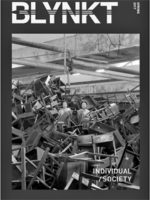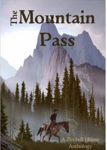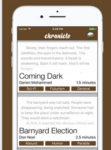Until May 31, the Simone Press anthology “Selected Places” is available as a free Kindle book. Eight short stories in which a sense of place is a central component:
To download it, CLICK HERE
Until May 31, the Simone Press anthology “Selected Places” is available as a free Kindle book. Eight short stories in which a sense of place is a central component:
To download it, CLICK HERE
My The Whole Truth is the lead piece in the Spring ’17 issue of  BLYNKT Magazine, whose theme is “Individual/Society.” Some other pieces well worth reading, too; download the magazine (free) by clicking here.
BLYNKT Magazine, whose theme is “Individual/Society.” Some other pieces well worth reading, too; download the magazine (free) by clicking here.
(Or read it at my website: Click here)
This is my favorite of the three I wrote for a contest demanding all-dialogue stories — not even a “he said/she said” — and the last to make it into print. The others are Tattoos and Customer Service.
I mentioned some time ago that I’d written three short-short stories for a contest requiring that every word be in quotes — not even a “he said, she said.” None of the three won the contest, but all three have been accepted elsewher e, and the second has now been published. You can read it here, at the Route 7 Review website.
e, and the second has now been published. You can read it here, at the Route 7 Review website.
But I’m not wild about Route 7’s typography; for a more legible version click here.
It’s hard to keep up with the innovations in presenting short stories. I’ve remarked before on the (I think new) phenomenon of paperback themed  anthologies of short stories, which ought to sell well in airport shops, but may also find buyers in old-fashioned bookstores and certainly online. I have stories in four such paperbacks now; the newest is “Mountain Test,” one of a dozen stories in a paperback titled The Mountain Pass. Get it at Amazon click => on the image or read my contribution here.
anthologies of short stories, which ought to sell well in airport shops, but may also find buyers in old-fashioned bookstores and certainly online. I have stories in four such paperbacks now; the newest is “Mountain Test,” one of a dozen stories in a paperback titled The Mountain Pass. Get it at Amazon click => on the image or read my contribution here.
An even newer idea: An app of flash fiction to read in the palm of your hand. If you have the app Chronicle Stories on your smartphone and have a few minutes to kill, relax with a very short story. During May, my “Barnyard Election” will be prominent before it’s pushed aside by newer stories. You can look for those readable in your time available (silence a TV commercial break to read mine in 2 1/2 minutes; the longest are five-minute reads) and even pick a story by style (mine is tagged as Absurd/Humor/Parable; others in this first round are tagged as Sci-Fi, Futurism, Surreal, Romance, Clothes, Loss, Family, Utopia, etc etc). To download the app (free, as are the stories), click on the smartphone image; or read my contribution here.
minutes to kill, relax with a very short story. During May, my “Barnyard Election” will be prominent before it’s pushed aside by newer stories. You can look for those readable in your time available (silence a TV commercial break to read mine in 2 1/2 minutes; the longest are five-minute reads) and even pick a story by style (mine is tagged as Absurd/Humor/Parable; others in this first round are tagged as Sci-Fi, Futurism, Surreal, Romance, Clothes, Loss, Family, Utopia, etc etc). To download the app (free, as are the stories), click on the smartphone image; or read my contribution here.
That was the challenge from U.K.-based Simone Press as it planned an anthology of new short stories, in which “the characters, plot and atmosphere [are] highly influenced by [the] setting, which . . . strongly affects the action, plot and direction of [the] story.”) The editors thought my “Beyond the Reef” met that criterion; it’s one of 29 such stories in “Selected Places,” just published as a $12.99 paperback or a $5.99 Kindle book (or for KindleUnlimited members, a free read), all at Amazon.
Not hard to figure out that my Open Carry was written not long after the November election. I’d begun to fear it wouldn’t find a home, but then a Canadian humor magazine accepted it. Read it now in The Dirty Pool.
An online flash-fiction literary magazine that hopes to Knock Your Socks Off has just published the shortest story I’ve tried yet. Read it here. (PS: The Attenborough video was real; the rest, imagined. And I’ve never even considered MENSA membership)
I this month read – and happily clipped – a New Yorker article explaining and defending, among other niceties of punctuation, the magazine’s insistence on the “serial” comma (following the last and of a series).
A kindred soul! I’ve seen recently too many defenses of sloppy editing, punctuation and word choice. In an era of compressed texts and tweets, it is argued, the finer points of communication are for old fuddy-duddies; the younger generation intuits fine distinctions from context.
Nonsense. Language must be rigorously used to be precisely understood, whether in novels or short stories or news articles.
I remember fondly learning the difference between rebut and refute from a grizzled copy editor at The Hartford Times, a WWII veteran who lacked my B.A. but was a better wordsmith. To be an objective journalist, he explained, I shouldn’t imply who might have won an argument: I could report that A rebutted – countered – B’s argument, but not that A had refuted – disproven – it.
Alas, such niceties fade. Dictionary.com nowadays agrees that refute means “to prove to be false or erroneous,” but allows rebut to mean not only “to oppose by contrary proof,” but also (as a third choice) “to refute by evidence or argument.” !!! Another loss of verbal precision, and with it the ability to guard the journalist’s impartiality.
My copy editor mentor taught me not to use other verbs. A shouldn’t point out B’s error, for instance: That implies there’s something there to be pointed out; use claim or charge. Similarly don’t use call attention to. You can probably think of other examples yourself.
Sadly, newspapers can’t afford to hire as many copy editors as I remember. Even the New York Times is eliminating one of six routine stops on a typical article’s review before publication. We can expect to see more imprecise or misleading phrasing in print — and even more online, where precision too succumbs to haste.
And don’t get me started on the disappearing subjunctive mood, to express doubt, conditionality or improbability. In the right context, I think anyone can still understand the difference between “Tom may have broken Joe’s jaw; they headed to the ER” and “Tom might have broken Joe’s jaw had not Charlie intervened.” But there are far more instances where was/were, may/might, can/could, will/would express subtleties that are too often lost by a generation that didn’t spend much school time studying grammar or parsing sentences.
Going back to the serial comma, sometimes called the Oxford or Harvard comma: The New York Times reported this month on a labor case that turned on the ambiguity of a Maine state law that failed to use a final comma. Read it here.
The New Yorker’s Daniel Wenger, the kindred soul I mentioned initially, offers several amusing illustrations of ambiguity when the serial comma is omitted. Among them, my favorite: “This book is dedicated to my parents, Ayn Rand and God.”
Texters and tweeters, en garde! You may be missing something, or failing to convey your full meaning. Let’s hear it for grammar, punctuation and punctilious use of words.
Several recent acceptances aren’t available to read in full yet, but two are: Have a look at “The Watchmaker,” inspired by the man who kept our Seth Thomas clock chiming, now posted by 99 Pine Street; and “The Terrorist,” published by Meat for Tea: The Valley Review.
 The owner of an old-fashioned hardware store has a last look around before anything unsold in his going-out-of-business sale will go to the highest bidder at auction. Published now at the online Canadian literary magazine (click here==>), Literary Heist.
The owner of an old-fashioned hardware store has a last look around before anything unsold in his going-out-of-business sale will go to the highest bidder at auction. Published now at the online Canadian literary magazine (click here==>), Literary Heist.